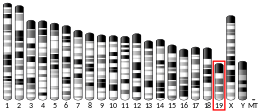L'HABP2 (pour « Hyaluronan-binding protein 2 ») est une protéase à sérine dont le gène est le HABP2 situé sur le chromosome 10 humain. Ses autres noms sont le FSAP, le HGFAL, le PHBP.
Historique
Il a été purifié et caractérisée en 1996[5].
Rôles
C'est un activateur de la fibrinolyse physiologique[6].
En médecine
Le port d'un variant du gène est un facteur de risque de maladie thrombo-embolique[7].
Une autre mutation est retrouvée plus fréquemment dans certaines formes familiales de cancer de la thyroïde[8].
Notes et références
- ↑ a b et c GRCh38: Ensembl release 89: ENSG00000148702 - Ensembl, May 2017
- ↑ a b et c GRCm38: Ensembl release 89: ENSMUSG00000025075 - Ensembl, May 2017
- ↑ « Publications PubMed pour l'Homme », sur National Center for Biotechnology Information, U.S. National Library of Medicine
- ↑ « Publications PubMed pour la Souris », sur National Center for Biotechnology Information, U.S. National Library of Medicine
- ↑ Choi-Miura NH, Tobe T, Sumiya J et al. Purification and characterization of a novel hyaluronan-binding protein (PHBP) from human plasma: it has three EGF, a kringle and a serine protease domain, similar to hepatocyte growth factor activator, J Biochem, 1996;119:1157-1165
- ↑ Römisch J, Vermöhlen S, Feussner A, Stöhr H-A, The FVII activating protease cleaves single-chain plasminogen activators, Haemostasis, 1999;29: 292-299
- ↑ Hoppe B, Tolou F, Radtke H, Kiesewetter H, Dörner T, Salama A, Marburg I polymorphism of factor VII-activating protease is associated with idiopathic venous thromboembolism, Blood, 2005;105:1549-1551
- ↑ Kumar Gara S, Jia L, Merino MJ et al. Germline HABP2 mutation causing familial nonmedullary thyroid cancer, N Engl J Med, 2015;373:448-455




